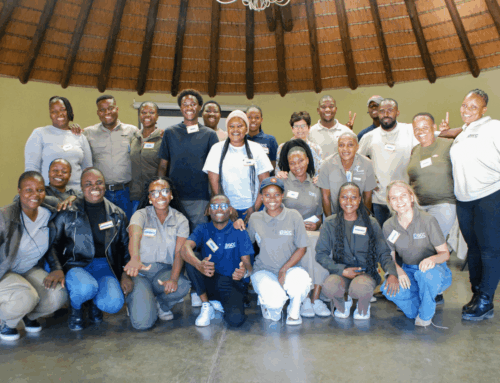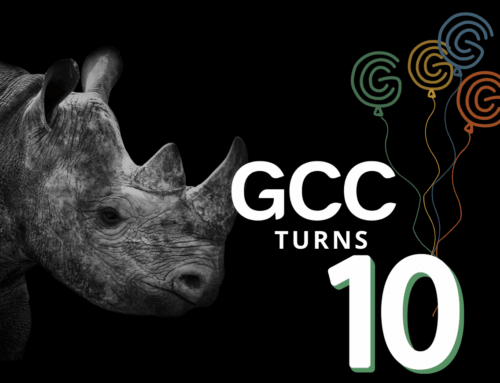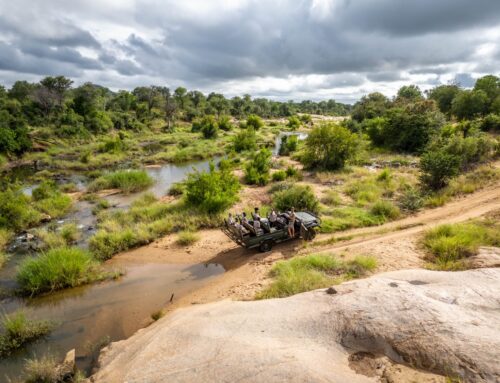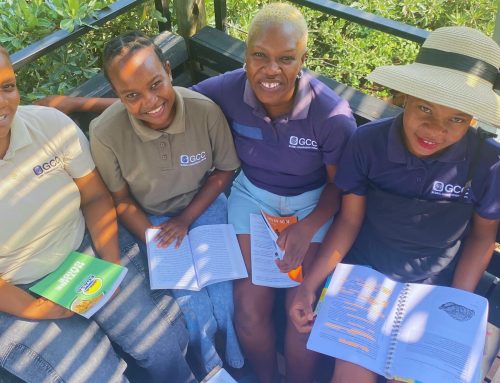Southern African Wildlife College’s Sboniso Phakathi talks about the new partnership with GCC, how things have changed in the conservation space, and new approaches to learning that are essential for positive change.
GCC: Can you tell us a little bit about the Southern African Wildlife College?
Sboniso Phakathi: The Southern African Wildlife College is a conservation based applied learning institute based in South Africa in the greater Kruger National Park, 10km’s south of the Park’s Orpen Gate. The land that we’re on is owned by WWF South Africa who founded the College and is managed by the Kruger National Park, so we are quite unique in that we are a contractual park in this area. The College was conceived in 1993 and opened its doors in 1996.
Essentially we have four training departments namely; Natural Resource Management, Community and Youth Development, Responsible Resource Use and Protected Area Integrity. Within the Protected Area Integrity department, we have three units, African Field Ranger Training Services, Aerial Support and a K9 Unit. We offer field ranger training at various levels, from basic unarmed and armed training to advanced field ranger training, and then very specialized training including Protected Area Security Operational Planning, Braveheart Leadership Training, Clandestine Operations, Customs Training and MIKE (Monitoring of Illegal Killing of Elephant) Training.
I work within the Community and Youth Development department. And within this department, we have the RISE unit which stands for Rural Initiatives for a Sustainable Environment, which I manage. Most of what we do is government-funded or has donor-specific funding.
Within the RISE unit, where we are working with GCC, we work with communities. This includes children’s conservation education programs or children’s education for sustainable development programs, all the way through to more of the landscape-based projects. Thanks to our partnership with Peace Parks Foundation, we are starting to move into the transfrontier conservation area space.

Our Natural Resource Management certificates include Transfrontier Conservation Management at NQF Level 6 which falls under Higher Education and Training and the other is a National Certificate Terrestrial at NQF Level 5, which is more occupationally based. We also have an applied l Research and Development department that’s really focused on improving conservation practice as an institution and contributes to the knowledge economy, whether it is research, training, or smart technologies.
How did the South African Wildlife College first connect to GCC?
We interacted with Matt (Lindenberg, GCC Founder and Executive Director) a few times on different levels in relation to the rangers and at some point, he shifted his focus to the protection of current rangers and development of future rangers, so a kind of stewardship in essence. We had a conversation and it has been consistently growing from there. It’s like planting a seed and watching it take root with Matt keeping it going.
What appealed to you particularly about GCC?
A couple of things. The career pathing was very important to me, and that there is a plan and a process. It made sense for us to build at the foundation phase of learning, from grades five to seven. It connected with me because I had tried to do this on my own working with primary schools and high schools. Young children are all so passionate, but the older learners in schools are more reserved and circumspect, asking questions like what are you doing here, you know. And GCC had a plan, a curriculum and it was structured. This is what appealed to me the most. It even had a teacher’s manual. I picked it up and was blown away. I wanted to use it myself! I think a large part of the appeal was also Matt’s consistent energy and passion; he leads with integrity and authenticity that makes it easy to get excited and embrace his ideas.
How are things changing in the conservation space?
We have come from a time in conservation where it was very old school. The way in which people engaged with conservation was very superficial. Field rangers had a history of being in relatively violent situations, and I am generalizing here of course, but you know, those who had been born in the ‘60s and ‘70s were often just out of the military and in this mindset of defending the country and the motherland and all of the propaganda that went with it – race, age, gender and just the nonsense that we learned from a very patriarchal system that was incredibly racist. To move from this space to protecting parks and the wildlife within parks from people living along the boundaries, really influenced how conservation expressed itself and resulted in protectionist fortress thinking.
This influenced the practice, so whether people were doing community outreach or educational programs, it was kind of superficial. People couldn’t dig deep because they weren’t digging deep in themselves especially coming from a segregated past. And there were problems, systemic issues, that we were seeing in conservation where it was very exclusive. To protect areas around the world, not only in South Africa, there was a hardcore process of moving people off the land, stripping them of their dignity and disconnecting them from the natural resources, and removing them from their culture and heritage. Our heritage is not just a space, it is everything in that space. So, the legacy of conservation has had to take that on board and acknowledge it.
But now we’re seeing a different crop of people who I believe have been energized by new thinking and by young people in conservation, with a different view and a different mindset. Matt is one of these people and it is awesome to see. He represents this new energy, this new approach that we have, seeing things differently, and being intentional about how we engage in this space.
How important is it in your mind to start engaging with children from primary school age?
I think you already answered this question when you started with “how important”! For any form of sustainability, whether on an analytical, regional, or national level, we need to influence culture and we really don’t have much time. I am not trying to be alarmist but we really don’t have much time. Our ecosystems and the spaces in which we live can’t really survive much more of our type of thinking and the type of engagement we are having with them. It isn’t a relationship that’s mutually beneficial in any kind of way.
I think education is just one way of touching what is natural. It creates a structured way for people to re-engage with themselves and what is within. As much as it is about environmental education, it is also education about ourselves. It is a reminder about who we are and being our most authentic and connected selves no matter we are and where we live. I may be sounding a little esoteric, but what I am trying to say is that we can talk to people about the trees as much as we want to, or the importance of the grass and earth, but it is so fragmented from the importance of soil or the importance of water or healthy ecosystems.
In order to have healthy ecosystems, we need to have humans – who obviously have a huge impact in the way they behave in the space – who have healthy families. Because the assumption is society is going to create itself, but it’s about family too, about having a present and loving mother and father who acknowledge their children’s emotions and feelings who make their children feel safe, otherwise you have a person who is going to take a lot of noise into society. So, whether or not you teach him or her about the importance of the tree, things are interconnected and I feel like some form of education for sustainable or environmental training is just one part of a broader conversation that we want to be having, but we don’t really know how to have it even if we want to have it.
What are you most looking forward to with this new GCC partnership?
There’s an opportunity for time and resources to add value to what the students are learning. We can add value to the curriculum, to what they are doing in school, we can bring a different energy to learning, and we can hopefully bring a different perspective to learning. And through that, hopefully, we can stimulate different conversations.
I hope we can have new approaches to learning, new approaches to working with each other as people, and how we interact with each other. With the use of the Future Rangers App, we can put so much more back into the program, and know how to measure the efficacy of our work. The App will also give us a live pulse on what is needed from the youth, and help steer the direction of where we focus. Giving students a track record of their progress will help drive change, most importantly for the youth.
And with the grade eight learners who are at an age where the whole state of puberty is a turbulent time with their brains doing crazy things, it would just be really awesome to create or influence the way in which the grade eight learners talk about the changes they are going through. And for them to have a space for different conservations, different perspectives of self, you know. And it’s not to put all of this weight on the GCC program, but I am excited about it as it gives us an opportunity as we will have a few interns at the College and it will give us an opportunity to work with other young people who will work with other young people.
With our interns, what we are seeing with the grade eight learners is that we are setting something in motion. You don’t necessarily know what is going to happen but we can try and guide it, coach and mentor where we can and of course it is structured learning. Just by creating a space and putting in some tools, you set ripples into motion and that’s kind of cool.
I think there is such a need to maintain positivity in African communities now more than ever, in all the communities around the world actually. From a local perspective, there are parents losing jobs, and people talking about rhino poaching in the communities, and people going to bed hungry in the evening. It is just all of these social challenges that people are facing including the lack services such as electricity and running water that many of us take for granted, which makes it easy to become despondent. And I’m saying this from a position of privilege as I do have a meal every day, a job, and a roof over my head and I am happy in life. But this is perhaps what drives me to help create some spaces for positivity whether you are working in the health space, or you are a teacher or a football coach or helping people to plant vegetables, whatever you are doing, it just needs to be intentional and really positive. I am not being evangelistic or anything like that, it’s just being present and showing up. I think this gives us all a space to motivate other people to go out there and do great things.




